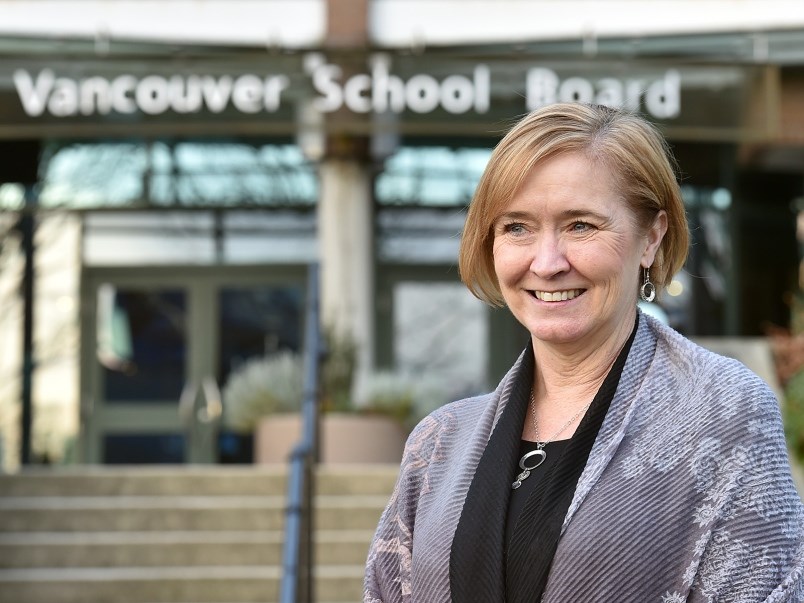This will be the strangest week-after-spring-break ever in Vancouver schools.
Teachers will be back at work, but kids won’t be in classes.
Rather, the first week back will mostly entail planning logistics, for both the immediate and longer-term futures.
The early part of the week will be spent with school principals talking to teachers and arranging for teachers to pick up any essential supplies, Vancouver School Board superintendent Suzanne Hoffman said in a video update posted on Twitter.
️Tune-in: #VSB39 superintendent @SAHoffman provides a third #COVID19 video update on what parents, students and staff can expect next week: https://t.co/lWcELGSERa
— SD 39 Vancouver (@VSB39) March 27, 2020
Later in the week, families can expect a phone call from their school, checking in and asking if their child has left anything important at school. Pick up times, with appropriate social distancing, will be arranged.
Also, teachers will be planning how to move forward with teaching their students remotely.
"… (I)t is vital students have a sense of routine and continued opportunities to learn while they are at home," Rob Fleming, B.C.’s minister of education, said in a news release.
The decision to suspend in-person classes is the right one. Children’s role in spreading the virus is largely unknown, although a study in Wuhan found that children tend to get milder illness, but they can sometimes become very ill or even die.
In California, a teenager’s death was linked to the virus and in Illinois, a baby who tested positive for COVID-19 died. It’s in the public interest to prevent any more deaths of young people and also to prevent them from passing it on to their family members.
However, learning and socializing is important for children’s development, so keeping some form of education and connection between schools and children is the right thing to do. We don’t know how long social isolation is going to be necessary. If it has to continue past September, laying the groundwork for at-home learning now will help.
In Alberta, on Saturday, school funding for support staff was abruptly cut, until schools reopen. That decision in that particular province could be political — a way to shift the burden of payments on to the federal government. I hope we don’t see anything similar here in B.C.
For now, the province says their main priority is a healthy and safe environment for all students, families and employees. But, this has to be done while still offering learning opportunities for all, supporting vulnerable students and making sure essential workers have child care.
Readers might think essential workers are merely those who work in healthcare. Not so. The list is long and includes everything from health care to food banks to transportation to grocery stores to mechanics to weather forecasters and many more.
There could be a lot of children requiring care. In Vancouver, child care for essential service workers is all being organized by Westcoast Child Care Resources Centre, not by VSB staff.
As we go through this, it will be important to remember that everyone is charting new waters – none of us have been here before.
“There is no expectation that we can duplicate a normal school day at home,” Fleming said. By working together and supporting each other, we will get through this."
The province has promised all students will get a final mark and all 45,000 Grade 12 students who are eligible to graduate will graduate. They’ve also created a new website, called
Open School with many tips for parents, such as staying on a regular schedule or creating a space for school work. It’s also stocked with lots of learning resources — fancy a virtual trip through the St. Lawrence Seaway, anyone — and activities people can do with their children to ensure they’re keeping up their reading and math skills.
While I’m sure no one had this in mind when they talked about “personalized learning,” this is definitely an opportunity to create it.
“I know everyone is pulling together on behalf of our students,” the VSB’s Hoffman said in her video chat. “We’re going one week at a time and seeing what happens during that week and then looking ahead to the next week.”
Taking it one day at a time, or one week at a time, is a good way to go. We don’t have much choice.
Meanwhile, as thousands of Canadians have lost their jobs and many businesses have closed, The Courier has put freelance columnists on hold. As such, this will be my last column here for a while. But I certainly hope to be back, writing about education and other social issues in B.C., before too long. In the meantime, follow me on Twitter @tracysherlock or visit my education blog HERE.



